WE-ACTx Legal Workshop: The Rights of Persons with HIV/AIDS in Rwanda
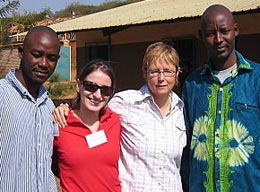
Megan McLemore (third from left) with her team, from left, Martin, Julia and Joseph |
WE-ACTx is a San Francisco-based NGO that has been working in Rwanda for two years. It currently provides full medical care, including ARVs when required, as well as food and income generation projects to more than 3000 women, many of whom were raped during the 1994 genocide. A new family and pediatric program will include their family members in its services. WE-ACTx provides its services through 24 local partner associations and employs more than 80 Rwandan staff members. The members of the partner organizations, generally, are poor, of limited literacy and live in or near Kigali.
The partner associations requested legal assistance from WE-ACTx, and in the summer of 2006 I received a grant from the University of Toronto Faculty of Law International Human Rights Program to travel to Rwanda and organize a legal workshop focusing on the rights of persons with HIV/AIDS in Rwanda. Each partner association was asked to send 2 representatives who were willing and able to assist other members of their organization and to share the information gained from the workshop. As the project was conceived, it was to have two aspects: a law portion which addressed protections against discrimination under current Rwandan (and international) law, and a skills portion emphasizing paralegal skills of mediation, negotiation, documentation and referral. All presentations and materials would be in the local language, Kinyarwandan.
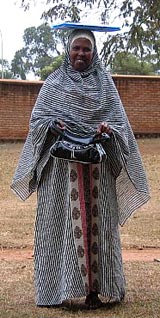
Student at the workshop |
With Anne-Christine d'Adesky, Co-Executive Director of WE-ACTx, and several international lawyers from the Netherlands and the US, we developed a list of key contacts in Rwanda of organizations and NGOs providing legal services, NGOs supporting legal services and capacity building such as the Danish Institute of Human Rights, and academic and university contacts. Our plan was to form a working group from these contacts in order to further develop and plan the details of the workshop.
I arrived in Rwanda June 4. We spent a month organizing the project. Along with Anne-Christine and Diafuka Salingita (Country Director of WE-ACTx) we began an intense round of meetings with key members of the legal and legal services community in Kigali as well as government officials, academics and NGOs involved in supporting legal services. As noted above, we had identified many of these persons in research done beforehand, but it was necessary to meet in person in order to gain an understanding of the political landscape, the extent of current services and how our project would complement those services, identify referral and network opportunities for our students after the workshop so that they would be connected to current legal services providers, and gain the support and approval of key government ministries for the project. Perhaps most importantly, it was essential to identify professors, lawyers and paralegals who were willing to teach the legal and paralegal skills portions of the workshop, as it was very important that the project be presented by Rwandans and represent a sharing of their expertise. This process required many face to face meetings, as very little substantive business is done by email or cellphone in Rwanda.
We received enthusiastic support from most contacts and the working group was formed by the end of June. The group included representatives of Rwanda's largest paralegal organizations, the Dean of the Faculty of Law of the University Libre of Kigali, as well as professors from the National University Faculty of Law and Clinique Juridique. The Rwandan government Ministries of Gender and Justice both warmly embraced the project and discussed entering into MOUs with WE-ACTx for follow up trainings of government officials in both gender violence and anti-discrimination against persons with HIV/AIDS. The Minister of Gender agreed to appear at our opening reception. There is no doubt that WE-ACTx's reputation as an effective and responsible health service provider and its relationship with the Ministry of Health contributed to the support we received for the legal project.
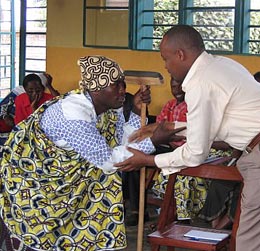
Roleplaying at the mediation workshop |
This process of organization lasted one month. We decided to hold the workshop in July, every Wednesday and Thursday for a total of 8 days. This format gives us time between sessions to continue the organic process of finalizing the details of the next session and making necessary adjustments. The first four days would cover protection against discrimination in civil law, including marriage, property and inheritance. Another two days would cover issues of sexual violence and HIV/AIDS, including how to bring a claim in the gacaca setting as well as in the national courts. The final two days would cover issues of VCT testing and confidentiality for one day, and the final day would be a wrap-up session focusing on follow up activities, providing networking connections to local legal services providers, and awarding "diplomas." These topics were developed by surveys sent to the partner associations as well as personal interviews with partner representatives during which they identified their most urgent legal problems. These issues were consistent with my research and study of issues related to HIV/AIDS in Africa.
Every module will provide the opportunity to role play paralegal skills in small groups. At the end of the workshop the materials will be compiled into a handbook entitled "HIV/AIDS in Rwanda: Know Your Rights." In Kinyarwandan and accessible to persons of low literacy, this will be the first handbook on the topic of legal rights and HIV/AIDS in Rwanda.
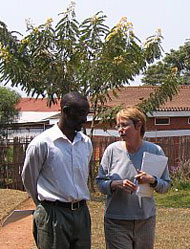
Megan McLemore with her translator and assistant, Martin |
The importance of having an opening ceremony in Rwandan culture had been emphasized, so our Opening Ceremony took place on July 3, 2006. The Minister of Gender and Family Promotion presided, and expressed her strong support for the project as most women living with HIV/AIDS in Rwanda did not know their rights. We ended up with five full minutes of TV coverage for the project.
The first two sessions were held on July 5 and 6. The National University of Rwanda Faculty of Law at Butare was extremely supportive of the project and provided distinguished professors for the first substantive legal session as well as instructors from their law clinic (Clinique Juridique) to run the practical skills/role play sessions in the afternoon. The students have been responsive and enthusiastic participants.
We look forward to the continued success of the workshop. It is clear that we are filling a gap in legal education and training, as few or none of the existing programs have specifically addressed HIV/AIDS. The rollout of treatment from the Global Fund, the Clinton Foundation and PEPFAR, the Bush program, has been underway now for 2 years and is changing the landscape of the disease in Rwanda. As the Secretary General of the Ministry of Justice told us in relation to the subject of the rights of persons with HIV/AIDS, "5 years ago, we might have told you to go away. But now, we are ready."
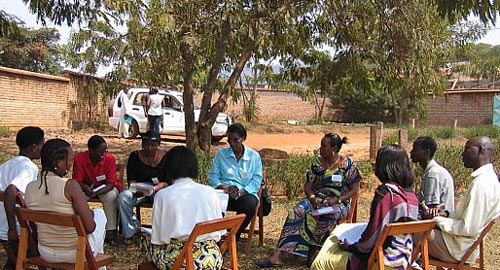
The workshop broke up into groups for mediation practice.
Each group had a different case, and planned a role play of a successful mediation.





